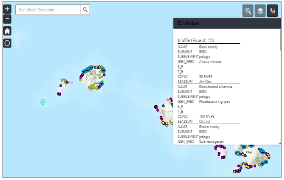Innovate! Observes World Reef Awareness Day, June 1, 2022
- Jun 1, 2022
- 3 min read
Updated: Nov 28, 2022
Coral reefs are vital to the ecosystems in the ocean and at the center of a complex food structure that is essential for a quarter of the world’s marine species. Not only do coral reefs provide protection for marine life, but they also provide a natural barrier to protect the
shoreline from violent storms, prevent coastal erosion, and contribute substantially to our economy through jobs and tourism. According to the Oceanic Society, coral reefs have an estimated economic value of over $30 billion per year and provide food, income, and coastal protection to more than 500 million people worldwide.
The coral reefs are highly impacted by pollution from runoff and sedimentation, chemicals and oil spills, plastics, disease, overfishing, destruction, deforestation, and climate change. Because of these factors, the coral reefs are under severe threat. The Coral Restoration Foundation reports that we have already lost more than half of the world’s coral reefs in the last 30 years.
As a green company, Innovate takes environmental issues to heart. We sponsor a 501c (3) organization, the Global Cooling Network, that works to preserve the environment. We design, develop, and implement systems and processes to monitor environmental risks. We also bring a global, analytical perspective to large-scale threats to environmental and human health. Many of our projects support missions that are critical to the coral reef ecosystem. In partnership with organizations such as the Environmental Protection Agency (EPA), Chesapeake Bay Program (CBP), National Oceanic and Atmospheric Administration (NOAA), National Aeronautics and Space Administration (NASA), and the United States Geological Survey (USGS), Innovate has built many custom applications that aid in evaluating and monitoring various environmental factors that contribute to coral reef health. Here are a few ways we are helping:
EPA Environmental Sensitivity Index (ESI) Widget: Innovate built a custom tool around a NOAA web service to provide a concise summary of coastal resources that are at risk if an oil spill occurs nearby. For example, for a given sea turtle species, the widget would display the nesting season, protected areas, and the contact information of the area manager.
EPA Region 9 Geographic Response Plan (GRP) Widget: Innovate created this widget to provide guidance for effectively deploying containment and recovery equipment in the event of a spill to navigable waterways.
Chesapeake Bay Program Geospatial Mapping: We developed several tools to help CBP’s goal of collecting, storing and distributing environmental monitoring data for the Chesapeake Bay watershed. One of the tools electronically links water quality and environmental data from the Chesapeake Bay and related river systems to people and organizations outside of the CBP.
As global citizens, we can all do our part to help protect the coral reefs. As awareness on this important issue increases, communities are calling for action to improve and protect the coral reefs around the world and June 1, 2022, has been designated the World Reef Awareness Day. NOAA lists 10 things we can do to support this effort:
Choose sustainable seafood. Learn how to make smart seafood choices at www.fishwatch.gov.
Conserve Water. The less water you use, the less runoff and wastewater that eventually find their way back into the ocean.
Volunteer. Volunteer in a local beach or reef cleanup. If you don't live near the coast, get involved in protecting your watershed.
Corals are already a gift. Don't give them as presents. It takes corals decades or longer to create reef structures, so leave them on the reef.
Long-lasting light bulbs are a bright idea. Energy-efficient light bulbs reduce greenhouse gas emissions. Climate change is one of the leading threats to coral reef survival.
If you dive, don't touch. Coral reefs are alive. Stirred-up sediment can smother corals.
Check sunscreen's active ingredients. Seek shade between 10 am & 2 pm, use Ultraviolet Protection Factor (UPF) sunwear, and choose sunscreens with chemicals that don’t harm marine life. For more information, visit oceanservice.noaa.gov/sunscreen.
Be a marine crusader. In addition to picking up your own trash, carry away the trash that others have left behind.
Don't send chemicals into our waterways. Nutrients from excess fertilizer increase algae growth that blocks sunlight to corals.
Practice safe boating. Anchor in sandy areas away from coral and seagrasses so that the anchor and chain do not drag on nearby corals.
For more information on this critical issue, visit the National Ocean Service website at https://oceanservice.noaa.gov/.
Related articles
NOAA, “The Importance of Water Quality:” https://sanctuaries.noaa.gov/news/aug21/water-quality-month.html
NOAA National Ocean Service “Connecting the Dots Between Corals and Humans” Podcast: https://oceanservice.noaa.gov/podcast/mar16/mw134-coral-human-connection.html
NOAA Coral Reef Information System: https://www.coris.noaa.gov/
The Oceanic Society: https://www.oceanicsociety.org/resources/blue-habits-tips/coral-reefs-and-climate-change-what-to-know-and-what-to-do/
The Coral Restoration Foundation: https://www.coralrestoration.org/coral-reefs






Comments